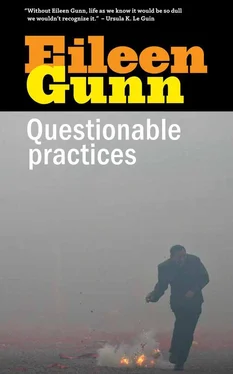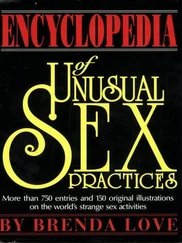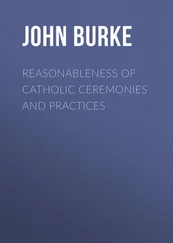Eileen Gunn - Questionable Practices
Здесь есть возможность читать онлайн «Eileen Gunn - Questionable Practices» весь текст электронной книги совершенно бесплатно (целиком полную версию без сокращений). В некоторых случаях можно слушать аудио, скачать через торрент в формате fb2 и присутствует краткое содержание. Год выпуска: 2014, Издательство: Small Beer Press, Жанр: Фантастика и фэнтези, на английском языке. Описание произведения, (предисловие) а так же отзывы посетителей доступны на портале библиотеки ЛибКат.
- Название:Questionable Practices
- Автор:
- Издательство:Small Beer Press
- Жанр:
- Год:2014
- ISBN:нет данных
- Рейтинг книги:5 / 5. Голосов: 1
-
Избранное:Добавить в избранное
- Отзывы:
-
Ваша оценка:
- 100
- 1
- 2
- 3
- 4
- 5
Questionable Practices: краткое содержание, описание и аннотация
Предлагаем к чтению аннотацию, описание, краткое содержание или предисловие (зависит от того, что написал сам автор книги «Questionable Practices»). Если вы не нашли необходимую информацию о книге — напишите в комментариях, мы постараемся отыскать её.
Eileen Gunn
Stable Strategies and Others
Questionable Practices — читать онлайн бесплатно полную книгу (весь текст) целиком
Ниже представлен текст книги, разбитый по страницам. Система сохранения места последней прочитанной страницы, позволяет с удобством читать онлайн бесплатно книгу «Questionable Practices», без необходимости каждый раз заново искать на чём Вы остановились. Поставьте закладку, и сможете в любой момент перейти на страницу, на которой закончили чтение.
Интервал:
Закладка:
As soon as she was gone, however, Able leaped out of the ropes that had constrained him and came directly to my assistance. Once freed, I liberated Creff, and together the three of us dashed upstairs.
As we burst through the door into the workshop, we could hear Gardner’s wagon roll off down the street, clattering noisily on the cobblestones, my infelicitous doppelganger off to who knows where.
In my workroom, we came upon a remarkable tableau. Scape was poised with the rucksack of money over his shoulder, his bleeding hand wrapped in a rag from my worktable. Miss McThane was pointing a small but professional-looking gun at him. And, across the room, the two burly henchmen assessed the scene.
The taller one addressed Miss McThane. “ ’E were runnin’ off wizzout paying, were ’e?”
“Save me from that crazy dame, you dumb gorillas!” bellowed Scape.
Able ran over to Scape and tugged at the rucksack, pulling it off his shoulder. It fell to the floor, spilling packets of five-pound notes. The larger of the two ruffians reached down and picked up a packet.
“This ’ere will do for me an’ my mate,” he said. “We hain’t greedy. ’Onest day’s work.” The two of them quickly thundered out the door.
Miss McThane nodded to Scape. “Toss me the sack,” she said.
Scape threw it at her ill-humoredly. Still holding Scape at gunpoint, she reached down to pick it up. Suddenly, clever Able leaped again from the shadows and, with the advantage of surprise, knocked the gun from Miss McThane’s hand, dragged it off to a corner, and, giving a few sharp warning barks, stood guard over it.
“Okay, okay,” said Scape. “The jig is up — you got the cabbage. Toss me my share, and we’ll call it even.”
Miss McThane laughed as if she were genuinely amused.
“Will someone kindly tell me what has just transpired?” I asked.
“Well,” said Scape, “Gardner’s a Texian whose old man went yours one better — invented a time machine, for moving back and forth, y’know. He wanted a mechanical man, and, well, I knew you had that useless can of brass — ”
Scape’s words were interrupted by a scream of agony from Miss McThane. We all of us — Scape, Creff, Able, and myself — turned to look at her. She was pulling the bundles of bills from the bag, fanning them open, and throwing them in the air. “Crap! What a load of shit! Your chump worked a grift on us.” She pitched an unopened bundle at Scape and hit him on the side of the head.
“Calm yourself, my dear Miss McThane,” I said. “Whatever is the matter?”
But Scape was way ahead of me. “He’s pitched us the snide, has he? He’s left us the green-goods? He seemed like such an honest bloke.”
“No wonder we’re always strapped. You can’t even put the flimp on a frick from the other side of time!” Miss McThane seemed caught between anger and despair. “You can gimme the gat back,” she said to the dog. “It’s no use even shooting him.”
I picked up one of the flash notes that were blowing about the room. The same appearance as our honest British banknotes, they were adorned not with our beloved Queen, but with a mustachioed fellow sporting a bowl haircut. Who on earth was this, I wondered.
Then I noticed the banner underneath. “William Bradford,” it read, “Governor of the Plymouth Colony.”
The Armies of Elfland
Eileen Gunn and Michael Swanwick
It was the middle of the night when the mirrors came out of the elves. With a sound like the cushioned patter of an ice storm, the tiny mirrors fell to the ground, leaving a crust of glitter behind the marching elf army. They bled, of course, but the elven blood restored the dry land, undoing the effects of the drought, and moss emerged green from the ground in the troops’ wake.
The sight of the moss brought forth the drought-starved humans and their pathetic get to the mouths of their caves.
“Stay here!” the new father commanded. Not one of the children was his. But all the real fathers were dead, so they had no choice but to obey him or be beaten.
“Don’t go,” Agnes wanted to say. “Don’t trust them.” But Richard gently touched her lips to silence her. Richard was the oldest of the children, indeed almost an adult himself, and he did what he could to protect the others.
The adults fell on the damp moss, tearing it up by the double-handful like so much bread dough. They sucked the moisture from it and crammed its substance down their throats. Briefly, all seemed well. One of the new father’s wives was raising an arm to beckon the children down when the minute mirrors they had ingested suddenly expanded to ten, a hundred, a thousand times their original size. Jagged shards of mirror erupted from their flesh as horns, tusks, and spines. Blood fountained into the air and pooled on the ground, glimmering in the moonlight. The adults splashed through it, lurching grotesquely, writhing and howling in pain.
The children hid their eyes and turned away. The littlest ones cried.
Then, suddenly, there was silence. That was the hardest to bear of all.
But though the adults had ceased screaming, they did not fall. Brutally sharp glass fragments jutted from every inch of their bodies, holding them upright and rigid.
Nothing that was human remained of the adults. They had turned to crystal.
“We’ve got to bury them,” Agnes said firmly. “We can’t just leave them standing like that.”
“How?” Richard asked. “We can’t even touch them.”
The children had no shovels, but even with shovels they would have had a tough time trying to dig graves on the dry, barren beach. Where they stood had once been the shore of a small arm of the Pacific Ocean. But then the ocean had dried up and become a low, mountainous land of cliffs and sudden rifts, blanketed with dead fish and rotting seaweed. The sun had baked the wasteland that the elves had first created and then crossed as black and hard as obsidian. There would be no burials there.
“We can throw stones,” Frederic said. He was the youngest of the children. He hadn’t spoken until he was three, which was over five years ago. When he did start to speak, however, his first words were, “Things are not as they once were.” Followed, after two days of intense thought, by, “In any case, they could be arranged better.” He came up with ideas nobody else could have.
So they did as he suggested, smashing the starlight-glittery figures from a distance until they were nothing but mounds of broken glass. Richard, who had read a lot back when there were books, said, “In ancient times when men were warriors and carried spears, they buried their dead in mounds of rocks called cairns. This was an honorable form of burial. Even kings and queens were buried that way.” Then he turned to Agnes. “You’re good with words,” he said. “Please. Say a few words over the dead.”
Agnes took a deep breath. At last she said, “The adults were stupid.” Everybody nodded in agreement. “But the elves are cruel, and that’s worse.” Everybody nodded again. “I’m sick of them, and I’m sick of their war.” She raised her voice. “I want to have enough food to eat! All the food I want, every day of my life. I’m going to get it, too. I don’t know how. But I do know that I’m never going to be fooled by the elves or their mirrors or their green moss ever again!”
She spat on the ground, and everyone else followed suit.
“Amen,” she said.
She had no idea how futile her vow would prove.
During the Alien Invasions, as they were called before the world learned that the armies of Elfland came not from someplace unimaginably far away but from somewhere impossibly nearby, the children and their parents had been vacationing on a resort near Puget Sound. So shocked were the parents that at first they didn’t think to shield the children from their television sets. So the children saw the slaughter — what happened to the people who resisted the elves, and then what happened to the people who didn’t. When the elves came to Seattle, they left the television stations untouched, and courteously escorted the cameramen to Volunteer Park to broadcast their victory celebration to whoever might still be watching.
Читать дальшеИнтервал:
Закладка:
Похожие книги на «Questionable Practices»
Представляем Вашему вниманию похожие книги на «Questionable Practices» списком для выбора. Мы отобрали схожую по названию и смыслу литературу в надежде предоставить читателям больше вариантов отыскать новые, интересные, ещё непрочитанные произведения.
Обсуждение, отзывы о книге «Questionable Practices» и просто собственные мнения читателей. Оставьте ваши комментарии, напишите, что Вы думаете о произведении, его смысле или главных героях. Укажите что конкретно понравилось, а что нет, и почему Вы так считаете.












